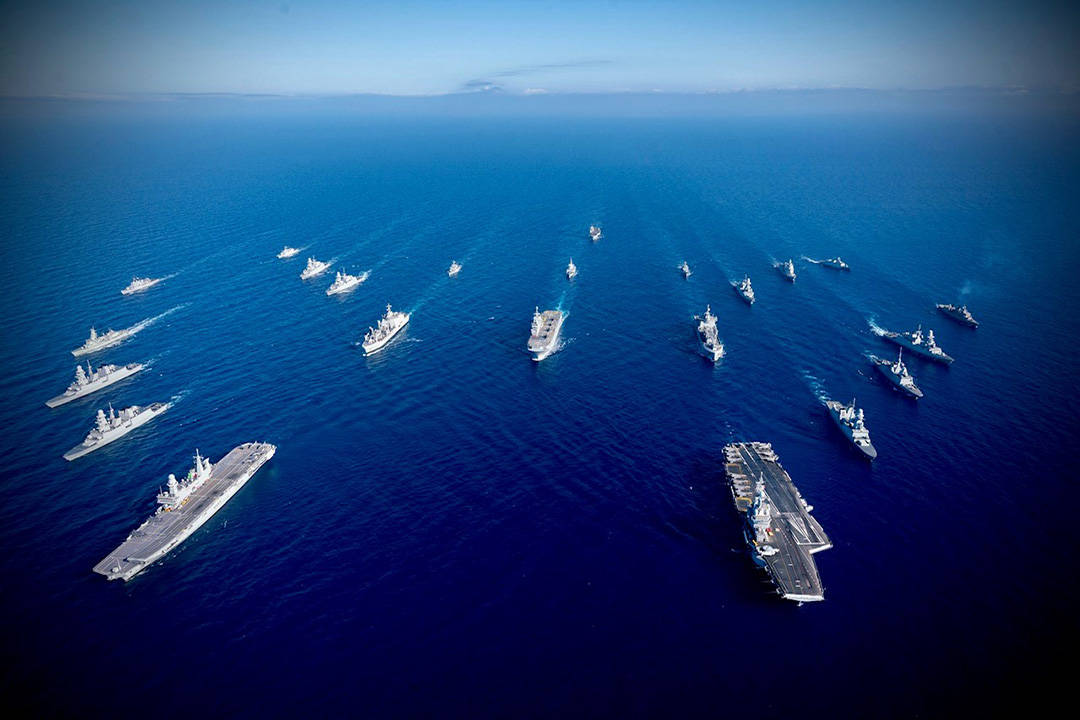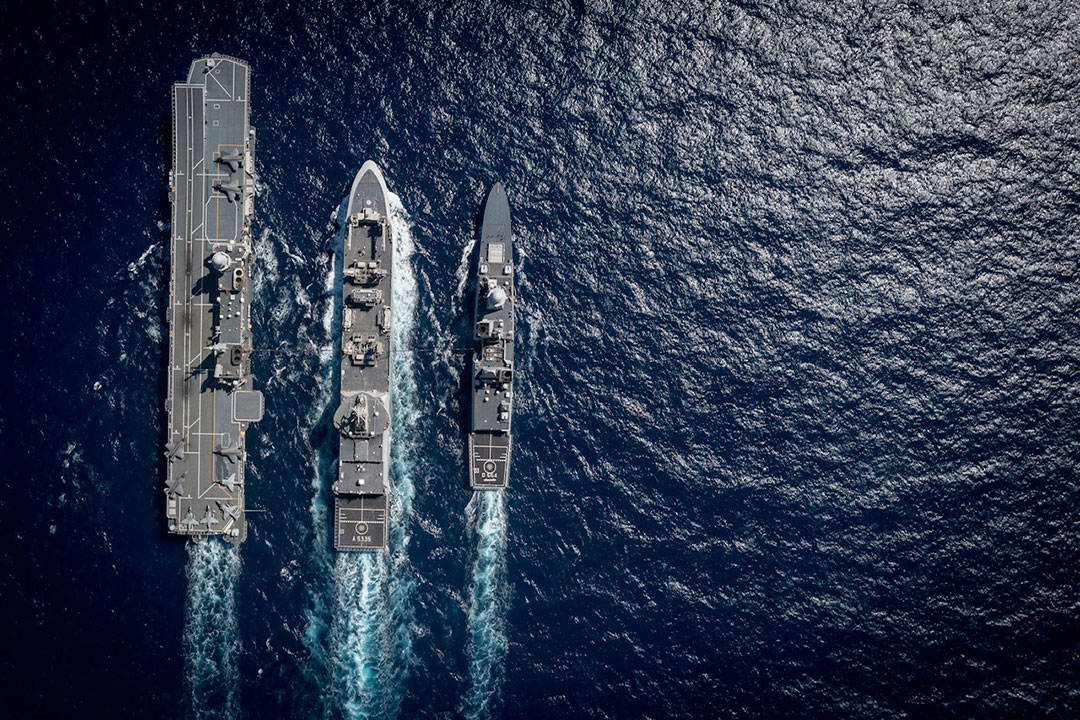Italy: The Globally Connected Mediterranean Power?
The recent meeting linking Italy, the UK and Japan through the Global Combat Air Programme, alongside the participation of the Cavour Carrier Strike Group in Exercise Pitch Black, showcase a country with growing links to the Indo-Pacific and the will to act upon them.
This year, for the first time in its history, the Royal Australian Air Force biannual exercise Pitch Black featured sea-based combat aircraft. This is a reminder of the growing requirement – especially in a maritime-centric battlespace such as the Indo-Pacific – for air assets from across different services to become more comfortable operating with each other to deliver integrated forms of effects.
However, what is even more striking about this novelty – pun unintended – is that the carrier group enabling this year’s exercise to take important steps in terms of integration is not from within the region, including the US – despite the country’s forward home-ported carrier presence in Japan. It is, in fact, the Italian carrier strike group (CSG) centred on the carrier ITS Cavour. At 27,000t displacement, the Cavour is larger than the Japanese Izumo class currently converted to operate fixed-wing aircraft, and carries an air wing including AV-8B Harrier II jets and cutting-edge F-35B aircraft.
Meanwhile, in London, as Italian aircraft exercised over Australian skies, the Italian Minister of Defence Guido Crosetto met with his Japanese and British counterparts to discuss cooperation over future long-range aircraft under the Global Combat Air Programme (GCAP) initiative.
Taken together, this is a considerable display of both political commitment towards, and capabilities operating in, a part of the world that until recently lay beyond the realm of a longstanding regionally focused naval and military posture. This begs three questions. At the most basic level, why is there an Italian CSG in the Indo-Pacific in the first place? Is this yet another deployment joining the flurry of other European forays into the region? And, of no less relevance, in what ways – if at all – do these developments matter to the UK?
This commentary argues that the answers to these questions highlight a significant shift in approach to international affairs under Giorgia Meloni’s government. Such a shift is both a reflection of, and a driver for, the reconceptualisation and expansion of Italy’s geopolitical concept of an ‘enlarged Mediterranean’ which informs the country’s foreign and security policy.
In particular, this article suggests that Italy’s current economic and strategic pursuits as a European actor aim at extending its reach beyond the confines of the country’s North African and Near East links. The government’s new Indo-Pacific aspirations have invited two significant policy changes. On the one hand, Italy endeavours to expand links beyond Europe by playing to the strength of expanding trade connections with actors in the Gulf and Indo-Pacific. On the other, the Italian government seeks to act upon the notion that economic opportunities would be best served by a wider strategic engagement with key partners – not least in the Pacific region – that reflects the current volatility of international security.
The Cavour CSG’s arrival in the Indo-Pacific is a sign that Italy’s ‘enlarged Mediterranean’ concept is expanding further eastwards for specific strategic and economic reasons
Ultimately, this article suggests that the recent ministerial meeting in London and the Cavour’s deployment to the Indo-Pacific – showcasing a much deeper level of engagement with key regional actors like Australia and Japan – are two sides of the same coin. They are the most visible political and military manifestations of how the Italian government is set to employ more robust military statecraft to underwrite its efforts in support of a more confident foreign and security policy agenda.
A Networked Mediterranean Power for an Age of Global Contestation
There are three main reasons that explain Italy’s increased focus on the Indo-Pacific. The first concerns Prime Minister’s Meloni personal desire to reinvigorate Italy’s role as Europe’s economic bridge with Africa and the Gulf. In 2023, the initial implementation of her signature economic initiative, the ‘Mattei Plan for Africa’, combined with the launch of the India-Middle East-Europe Economic Corridor (IMEC), created the ideal conditions for a structured approach to Italy’s influence in sustainable infrastructure and energy development across the three regions.
As the name suggests, the Mattei Plan sought to renew Italy’s engagement with Africa, tackling crucial issues from migration to economic development. In June 2024, just a year after its official launch, the Mattei Plan received additional political validation through the support of the G7 Partnership for Global Infrastructure and Investment. This initiative is designed to support flagship projects to deliver ‘transformative economic corridors’, linking the Mattei Plan and IMEC seamlessly.

Against this background, it is also worth recalling that efforts to reduce Europe’s energy dependency on Russia in the wake of the war in Ukraine, and the Italian government’s decision to disengage from China’s Belt and Road Initiative, have further contributed to a foreign policy outlook focusing on engagements to the south and east of the Mediterranean region. Of no less relevance, the longstanding challenge of migration across the Mediterranean has created an expectation that a conservative government in Italy will take firm action.
It would therefore seem no coincidence that Giorgia Meloni’s visits to India and the UAE in 2023 aimed to convey her different and more strategic approach to foreign policy, with a clear emphasis on the future of the energy and security sectors. In particular, in India, Meloni announced that Italy would join Prime Minister Narendra Modi’s Indo-Pacific Oceans Initiative, taking a leadership role on the science and technology pillar.
The second reason unfolds from the above. In a fractured world order, with war raging in Europe and crises growing from the Middle East to the Taiwan Strait, the Italian government views links with the Indo-Pacific as a critical defence industrial cooperation opportunity. In this respect, Defence Minister Guido Crosetto has been clear on the strategic importance of the GCAP collaboration with Japan and the UK for ensuring Italy’s military technological edge in a key domain of future warfare.
Indeed, in the aftermath of the GCAP announcement in December 2022, Italian sources reported that the country’s bilateral trade with Japan witnessed a 10% increase in 2023 compared to the previous year, reaching a total of some €15 billion. Stronger political links in terms of technological and scientific collaboration, together with the more favourable conditions created by the European trade framework between the EU and Japan – enacted in 2019 – are likely to have contributed to this expansion of trade ties.
Beyond economic cooperation, during Meloni’s visit to Japan earlier this year, a series of new initiatives in the area of defence and security were unveiled, including training, reciprocal visits and activities within the framework of the G7 – the latter especially since Italy holds this year’s presidency of the group. As the Cavour CSG heads to Japan in August to militarily underwrite Italy’s commitment to these political steps, the country is set to develop a security relationship with Japan not too dissimilar to those enjoyed by the UK and France.
This leads to the third reason that explains why an Italian carrier is in the Pacific region. Substantive military cooperation and engagement underwrites economic ambitions, and it serves as a downpayment on the capacity of future capabilities to produce effects.
The Cavour CSG will achieve Initial Operational Capability status during the deployment, and Pitch Black represents a critical step in that process. This is why the deployment has been designed as a very operationally active endeavour.

Starting in June, the Cavour played an active part in the largest naval exercise in the central part of the Mediterranean Sea since the end of the Cold War, witnessing the convergence of the Italian Mare Aperto with the French POLARIS exercise. The Cavour operated as at-sea direction of exercise and acted as the main strike group component together with the French Charles de Gaulle carrier group. On its way to the Indo-Pacific, it supported the Noble Shield, ASPIDES and Atalanta operations and enjoyed Spanish and French escorts, testing interchangeability and interoperability with key NATO allies.
Interactions with Australia and Japan will be carried out with the same attention to operational proficiency, providing the opportunity to acquire a more granular understanding of how to operate in this theatre. Both objectives will be essential for Italy to develop the capacity to consider how best to allocate capabilities to maintain a more regular regional engagement, and indeed to deliver on the expectations surrounding recent initiatives.
Conclusion: Staying Power as the Key to an Indo-Pacific Profile
This is why the Cavour CSG’s arrival in the Indo-Pacific should not be seen as yet another in a flurry of European deployments. It is light on purely diplomatic port calls, and heavier on substantive training and engagement. It is a sign that Italy’s ‘enlarged Mediterranean’ concept that previously extended as far as the Gulf and the Western Indian Ocean is now expanding eastwards for specific strategic and economic reasons.
The Italian Indo-Pacific engagement can count on a modern, proficiently run and technologically advanced fleet, together with air assets from both the air force and the navy
This is also why Italy’s policy activism east of Suez matters to the UK – especially under its new Labour government. Meloni’s Italy shares the UK’s vision of an engagement with an enlarged Mediterranean that is progressive in its focus on prosperity and governance, but realistic in acknowledging how key capabilities are necessary to transform ambitions into reality. Crucially, through GCAP, Italy can serve as an ideal partner for the UK as it seeks to prioritise European ties while remaining engaged in the Indo-Pacific through strategically significant collaborations.
Looking ahead though, Italy’s main challenge concerns the long-term sustainability of its numerous military commitments. The Italian Indo-Pacific engagement can count on a modern, proficiently run and technologically advanced fleet, together with air assets from both the air force and the navy. This is significant because it showcases the potential of the Italian defence industry and sets up the possibility of identifying efficient ways to cooperate with crucial partners in the future.
Last year, Italy sent its newest offshore patrol (OPV) vessel, ITS Morosini, to the region as a first step anticipating this year’s CSG. This year, another OPV of the same class, but more heavily armed – ITS Montecuccoli – also deployed to the region and participated in RIMPAC before joining the task group in Australia. In 2024–25, the training sailing ship ITS Vespucci will also visit the region as part of its worldwide campaign. An immediate future of persistent engagement is, for now, guaranteed.
Meanwhile, the Italian navy remains heavily engaged in leadership roles in NATO and in the EU operations ASPIDES and Atalanta, as well as in Combined Maritime Forces task groups. Ensuring continuity across commitments, therefore, will be key if Italy is to capitalise on current investments. In last year’s summit with former UK Prime Minister Rishi Sunak, both countries recognised the opportunity for Italy to contribute to the UK CSG 25 deployment. This could be one way of extending this year’s carrier engagement that would offer clear advantages. If confirmed by the new government, such a step would both cement Italy–UK ties and reinforce the notion that the UK and Italy are part of a wider European effort in the Indo-Pacific.
With the outcome of the war in Ukraine far from being assured and continued disruptions in the Red Sea which have affected traffic to major Italian ports, Italy’s Indo-Pacific ambitions are under strain. Opportunities exist, however, to ensure continuity beyond 2024. What remains certain is that the strategic and economic factors that have propelled recent initiatives – not least the CSG deployment – are unlikely to vanish anytime soon, and will serve as the main guarantee of future opportunities.
The views expressed in this Commentary are the author’s, and do not represent those of RUSI or any other institution.
Have an idea for a Commentary you’d like to write for us? Send a short pitch to commentaries@rusi.org and we’ll get back to you if it fits into our research interests. Full guidelines for contributors can be found here.
WRITTEN BY
Professor Alessio Patalano
RUSI Senior Associate Fellow, Military Sciences
- Jim McLeanMedia Relations Manager+44 (0)7917 373 069JimMc@rusi.org



